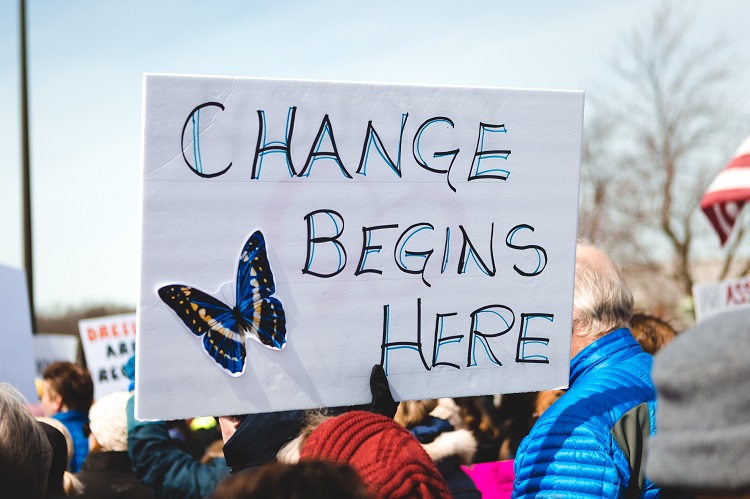My fiancée and I were recently asked to share some brief thoughts on the midterm elections, which, in terms of modern American history, were cataclysmic—the worst losses since 1948. People say they are fed up with the status quo in Washington. A mere two years after hating on Bush and the Republicans, they’ve now dealt Democrats an even more severe blow. It seems most of the public has little love for either of the two major political parties. Nothing seems to make them happy. Revolutionary rhetoric has even surfaced in some quarters.
And yet both my fiancée and I—independently, mind you—actually chose to focus our short comments not on the goings-on in Washington but rather on voters. Plenty, of course, could be said about the Democrats’ performance over the past two years, and both she and I could level multiple critiques. But more interesting, at least to me, is the question of what is going on among the American people. What is behind their apparently deep, nonpartisan antipathy to those governing the country? How can so many independents switch their disgust from Bush to Obama in such a short amount of time?
Personally, I think much of the dissatisfaction we see is actually a projection of a deeper dissatisfaction—a vague feeling in many people, not fully-formed, that they themselves have lost something, and that our country has lost something; a dissatisfaction with both who they have become and who their country has become; a dissatisfaction with roots deeper in their vocation, in some of the very anchors of their identity.
The Georgetown politics professor (and blogger) Patrick Deneen wrote recently of this, though in language I view as too harsh:
We love to blame Washington and its politicians, but our hatred of D.C. is really only a projected form of self-loathing. Washington is simultaneously the locus of our fears and our expectations: we want to be left alone, but we want to be taken care of. We want government out of our lives, but we want it to solve our problems. We insist on more local solutions, but grow immediately impatient when solutions are not immediate. We look with fear and longing on our President—no matter whom—as the one we despise and the one we adulate.
In other words, we want government to be out of our lives—and that it solve most of the problems we face as a society. We lack trust in its ability to do so, but have plenty of umbrage to display when we perceive any lack of government efforts on our behalves. Networks switch instantaneously between segments on “The Fleecing of America” and sanctimonious tut-tutting when a fallen swallow lacks a government program.
So, we now careen between the two parties, the one promising to solve our problems, the other promising to get Government out of our lives. We love and hate them both: two years ago we longed for a savior to deliver us from Bush’s incompetence and put the nation back on the footing of hope and change; today we fear socialism and long for morning in America.
Our hatred of Washington is a hatred of ourselves, above all for our contradictory longings that we refuse to face. We pine for a time of accountability and responsibility, but fear the burdens of sacrifice and self-government. We ache for a government that can make America great again, and suspect that any effort in that direction will further impoverish subsequent generations. We long to be self-sufficient, but fear a world without safety nets.
…The source of our loathing [is] the division within ourselves. The divided government we will embrace is the division in our souls…
I don’t think it’s quite fair or accurate to say that Americans hate themselves, but Deneen is definitely on to something here. Americans recognize, perhaps ineffably, that to a great extent they are complicit in what our country and its politics have become. As much as they wish to deny it, we are still very much, in Lincoln’s phrase, a government “of the people, by the people, for the people.” Politicians and the media speak to the crowd—politicians need people’s votes and the media their attention. Each for different motives, they seek to give people what they want. What has happened in the government and politics of our country, the focus of so much intense critique, cannot be separated from what has happened to us, the American people (click here for a deeper exploration of this phenomenon).
If our government has fallen, to some extent we have fallen as well. Even if people are not consciously aware of this, I believe in some part of their being it is understood. The intensity of feeling we see in many Tea Partiers, for instance, does not occur unless deeper questions than mere politics are engaged. Americans are angry at themselves, too: What has become of us, they ask, and how did we let this happen? Some of this sentiment likely stems from mere nostalgia, imprecise memories of a bygone era. But some, I believe, comes from the recognition of a real loss in values, maturity, and integrity.
This is why Obama (and Gandhi) were right, profoundly so, when they said Be the change you wish to see in the world. As Christians, we should know that this is no mere cliché, that its meaning lies far deeper. It is, in fact, no less than the call to holiness, which God has asked of all of us. More than a political revolution, our country needs conversion, and as long as we lack the latter we will wrongly see the former as the answer to our problems.
As Peter Kreeft has written: “I can think of nothing else that can save this civilization except Saints. Please be one.” Indeed.



